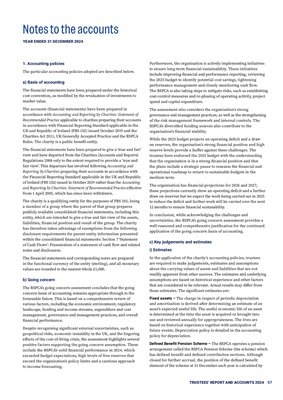
TRUSTEES' REPORT AND ACCOUNTS 2024 57
Notes to the accounts
YEAR ENDED 31 DECEMBER 2024
1. Accounting policies
The particular accounting policies adopted are described below.
a) Basis of accounting
The financial statements have been prepared under the historical
cost convention, as modified by the revaluation of investments to
market value.
The accounts (financial statements) have been prepared in
accordance with Accounting and Reporting by Charities: Statement of
Recommended Practice applicable to charities preparing their accounts
in accordance with Financial Reporting Standard applicable in the
UK and Republic of Ireland (FRS 102) issued October 2019 and the
Charities Act 2011, UK Generally Accepted Practice and the RSPCA
Rules. The charity is a public benefit entity.
The financial statements have been prepared to give a 'true and fair'
view and have departed from the Charities (Accounts and Reports)
Regulations 2008 only to the extent required to provide a 'true and
fair view'. This departure has involved following Accounting and
Reporting by Charities preparing their accounts in accordance with
the Financial Reporting Standard applicable in the UK and Republic
of Ireland (FRS 102) issued in October 2019 rather than the Accounting
and Reporting by Charities: Statement of Recommended Practice effective
from 1 April 2005, which has since been withdrawn.
The charity is a qualifying entity for the purposes of FRS 102, being
a member of a group where the parent of that group prepares
publicly available consolidated financial statements, including this
entity, which are intended to give a true and fair view of the assets,
liabilities, financial position and result of the group. The charity
has therefore taken advantage of exemptions from the following
disclosure requirements for parent entity information presented
within the consolidated financial statements: Section 7 'Statement
of Cash Flows': Presentation of a statement of cash flow and related
notes and disclosures.
The financial statements and corresponding notes are prepared
in the functional currency of the entity (sterling), and all monetary
values are rounded to the nearest whole £1,000.
b) Going concern
The RSPCA's going concern assessment concludes that the going
concern basis of accounting remains appropriate through to the
forseeable future. This is based on a comprehensive review of
various factors, including the economic environment, regulatory
landscape, funding and income streams, expenditure and cost
management, governance and management practices, and overall
financial performance.
Despite recognising significant external uncertainties, such as
geopolitical risks, economic instability in the UK, and the lingering
effects of the cost-of-living crisis, the assessment highlights several
positive factors supporting the going concern assumption. These
include the RSPCA's solid financial performance in 2024, which
exceeded budget expectations, high levels of free reserves that
exceed the organisation's policy limits and a cautious approach
to income forecasting.
Furthermore, the organisation is actively implementing initiatives
to ensure long-term financial sustainability. These initiatives
include improving financial and performance reporting, reviewing
the 2025 budget to identify potential cost savings, tightening
performance management and closely monitoring cash flow.
The RSPCA is also taking steps to mitigate risks, such as establishing
cost-control measures and re-phasing of operating activity, project
spend and capital expenditure.
The assessment also considers the organisation's strong
governance and management practices, as well as the strengthening
of the risk management framework and internal controls. The
RSPCA's diversified funding sources also contribute to the
organisation's financial stability.
While the 2025 budget projects an operating deficit and a draw
on reserves, the organisation's strong financial position and high
reserve levels provide a buffer against these challenges. The
trustees have endorsed the 2025 budget with the understanding
that the organisation is in a strong financial position and that
the plans include a strategic pause to reassess the financial and
operational roadmap to return to sustainable budgets in the
medium term.
The organisation has financial projections for 2026 and 2027;
these projections currently show an operating deficit and a further
draw on reserves but we expect the work being carried out in 2025
to reduce the deficit and further work will be carried over the next
12 months to ensure financial sustanability.
In conclusion, while acknowledging the challenges and
uncertainties, the RSPCA's going concern assessment provides a
well-reasoned and comprehensive justification for the continued
application of the going concern basis of accounting.
c) Key judgements and estimates
i) Estimates
In the application of the charity's accounting policies, trustees
are required to make judgements, estimates and assumptions
about the carrying values of assets and liabilities that are not
readily apparent from other sources. The estimates and underlying
assumptions are based on historical experience and other factors
that are considered to be relevant. Actual results may differ from
these estimates. The significant estimates are:
Fixed assets - The charge in respect of periodic depreciation
and amortisation is derived after determining an estimate of an
asset's expected useful life. The useful economic life of an asset
is determined at the time the asset is acquired or brought into
use and reviewed annually for appropriateness. The lives are
based on historical experience together with anticipation of
future events. Depreciation policy is detailed in the accounting
policy for depreciation.
Defined Benefit Pension Scheme - The RSPCA operates a pension
arrangement called the RSPCA Pension Scheme (the scheme) which
has defined benefit and defined contribution sections. Although
closed for further accrual, the position of the defined benefit
element of the scheme at 31 December each year is calculated by